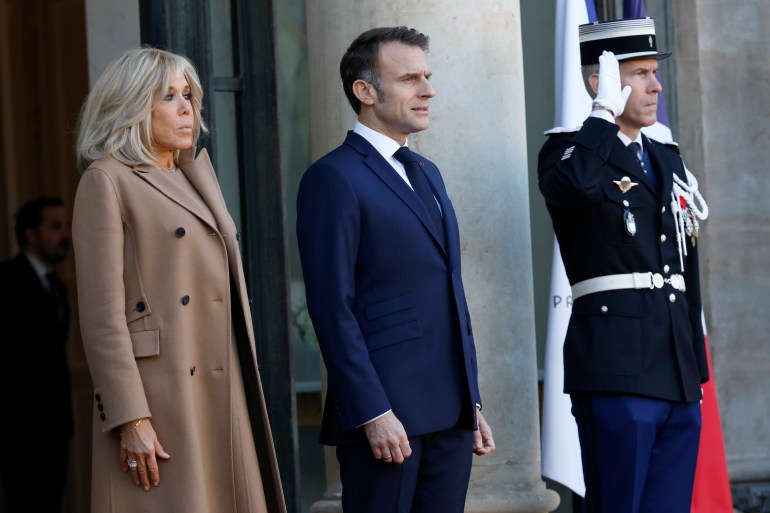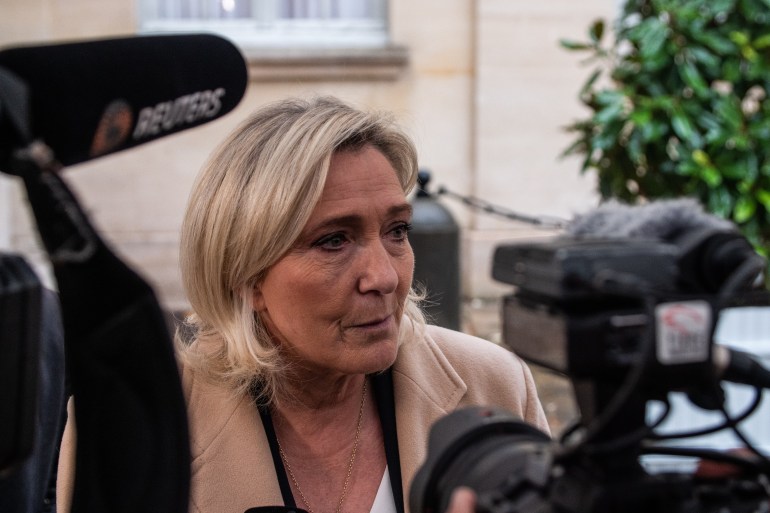After less than four months in power, French Prime Minister Michel Barnier’s government has lost a no-confidence vote in parliament over a social security budget dispute.
On Wednesday evening, 331 French legislators from left- and right-wing parties, out of a total of 577 legislators, voted in favour of removing the EU’s former Brexit negotiator and his administration in France’s lower house of parliament.
Barnier, 73, was due to officially present his resignation to French President Emmanuel Macron on Thursday morning. The last time a prime minister resigned following a no-confidence motion was in 1962 when PM Michel Debre, who served under Charles de Gaulle, the founding father of the Fifth Republic and the president of France, resigned over the Algerian crisis.
Barnier’s resignation not only throws Paris into political chaos for the second time this year but also leaves the country without a budget for 2025.
A statement from the Elysee Palace said President Macron would address the nation about what happens next on Thursday evening.
What led to the no-confidence vote?
French parliamentarians from the country’s left-wing alliance, New Popular Front (NFP), tabled the vote in opposition to Barnier’s recent austerity budget. This was later supported by the far-right National Rally (RN), when Barnier tried to push the budget through parliament without a vote.
His budget bill included tax hikes worth 60 billion euros ($63.2bn) and government spending cuts to social security and welfare worth about 40 billion euros ($42.1bn) designed to address the country’s deficit.
France’s public deficit is equivalent to about 6.1 percent of its gross domestic product. Barnier had stated his intention to bring it into line with European Union rules, which require countries to have a budget deficit ratio of no more than 3 percent.
“The choice we made was to protect the French,” Marine Le Pen, leader of the far-right RN told French broadcaster TF1 on Wednesday, after the no-confidence vote. The RN had wanted Barnier’s budget to include a rise in state pensions and a provision to scrap medical reimbursement cuts, among other budget concession demands.
“The main person responsible for the current situation is Emmanuel Macron. The dissolution and censorship are the consequence of his policies and of this considerable rupture which exists today between him and the French,” she added.
Speaking to France’s BFM TV on Monday, Mathilde Panot, of the left-wing France Unbowed (La France Insoumise, LFI) parliamentary group said: “This historic event is a powerful signal: no matter what happens, people can change the course of history. Now Macron must go.” France Unbowed has been opposed to Macron’s rule since his pension scheme reform which raised the national retirement age.
Experts said the uniting of left and right in France over this matter points to a deeper dissatisfaction with the present government.
“I think that I was surprised that it [no-confidence vote] went through,” Gesine Weber, a research fellow at the Paris office of the German Marshall Fund of the United States, told Al Jazeera.
“I didn’t expect that the RN party would support something that was brought in from the left force. But on the other hand, I think this also tells you a lot about the strategy of these political parties whose key ambition is to see this government fall and to slowly poison the political climate to such an extent that Macron is forced out of office,” she added.

What does this mean for Macron?
Macron, president of France since 2017, has a mandate until 2027, when the country’s next presidential elections take place. Several opposition figures such as Panot and RN adviser Philippe Olivier have called for him to step down sooner, however.
“There is no obligation or even expectation that he will resign – this is just something that some in the opposition are requesting/suggesting. France is a semi-presidential system, and the government and presidency are two separate institutions,” Marta Lorimer, lecturer in politics at Cardiff University, UK, told Al Jazeera.
Weber pointed out that while Macron could step down early if he wished to, it is highly unlikely.
“There is a pending court case against Le Pen which will be decided next spring. A very likely outcome of this case is that she might not be allowed to run for office again, or to run for any political office. So Macron is going to use this to his advantage,” she added.
Le Pen is currently on trial alongside other members of her party on charges of embezzling EU funds – a claim she denies.
Meanwhile, pressure is building on the Elysee Palace as the nation awaits to find out how Macron will form the next government.
Who will Macron appoint as prime minister now?
At this point, it’s very hard to say.
The French president has already been criticised for his choice of prime minister, especially by the NFP, which won the most votes in the snap parliamentary election in July. He picked Barnier to appease the right wing, which had won the most votes in the first round of voting but lost in the second – after central and left-wing parties joined forces to block the right by deselecting certain candidates for the second round.
“In short, [Macron] preferred a pact with the ultra-liberal right and the far-right to one with the left, in order to continue ultraliberal policies, despite clear rejection by the majority of the French people,” Jonathan Machler, a civil society activist and member of the French Communist Party told Al Jazeera.
“This motion of censure therefore puts an end to an illegitimate government that few were betting on. It’s a good thing for our democracy,” he added.
According to Lorimer, whoever Macron picks next will struggle to find a stable majority.
“He could either go for another minority cabinet, perhaps getting some form of pact of non-belligerence in place. For example, if he appointed someone from the left, he would have to get the agreement from the centre and the right not to vote a no-confidence motion against them,” she said.
“He could also look into a technocratic profile, and appoint someone with a fairly narrow mandate but who could at least get France to vote a budget law for the year 2025. Finally, he could once again try and facilitate the creation of a broad coalition of the centre, centre-right and centre-left but to do this, he would first have to get the left to break up,” Lorimer added.
Weber thinks Macron will appoint a caretaker government for the short term to basically pass a provisional budget for France, preventing the country from plunging into an economic crisis.

What does this mean for Le Pen?
French right-wing leader Le Pen, whose RN political party was initially projected to win July’s snap elections after winning the most votes in the first round, has been eager to become the country’s president in 2027.
Some analysts say her party’s vote against Barnier could also be risky for her presidential aspirations since the vote has thrown France into political turmoil.
“Le Pen is now in full ‘damage control’ mode,” Lorimer said.
“She realises that voting for a no-confidence motion, thereby potentially leading France into serious political and economic turmoil, goes against the strategy of ‘respectabilisation’ she has been pursuing,” Lorimer said.
“It is for this reason that she is appearing almost contrite in her reaction to the fall of the Barnier government: the party line seems to be ‘we take no pleasure in bringing down the government, but we were forced to do so because the alternative would have been worse,’” Lorimer said.
Speaking to France’s news network, TF1, on Wednesday night, Le Pen said: “We voted to censure the government to protect the French people from this budget.
“We have been constructive from the start, and we will be with the next prime minister who will be required to propose a new budget. What we want is for our voters to be respected and their demands heard.”
How have people in France reacted?
Barbara Darbois*, who lives in Avignon, in southeastern France, told Al Jazeera that she is wondering if her country has hit “La catastrophe” (disaster).
However, she added, France is used to such lows. “Look at our football team, they can be world champions and be pretty lame four years later. We expect a new prime minister soon … If the government falls again I would bet for an Article 16.”
When French institutions or territory are threatened, Article 16 of the French constitution grants the president exceptional powers to make decisions.
Machler said French people appear to be “more exhausted with Macron and his ultra-liberal and increasingly right-wing policies, than of the current, temporary instability”. In general, they hope to see a change in some of his policies as a direct result of this no-confidence vote.
He noted that dissatisfaction with Macron’s policies has erupted in France – as was demonstrated during the 2018 yellow vest movement (protests over fuel tax hikes), the 2023 retirement pension movement (protests against Macron’s pension reforms and his plan to raise the retirement age from 62 to 64 years), the 2023 protests against police violence, the 2024 farmers’ protests (demonstrations demanding better pay and protection from foreign competition), feminist movements and most recently with Palestine protests.
“I’d say there’s a mixture of relief, hope and concern, given the unprecedented nature of the situation,” he said.
“The relief is inevitable because the budget that was proposed [and which provoked the motion of censure] deepened Macron’s disastrous policies. There is hope, because the change in policies can now finally be implemented, if ever Macron accepts the victory of the NFP [in the snap elections].”
What does this mean for Europe?
The political instability in France comes as the bloc braces for a Donald Trump presidency in the US. Trump is also set to visit the French capital over the weekend for the Notre Dame Cathedral reopening.
Shairee Malhotra, deputy director and Europe fellow at the Observer Research Foundation in New Delhi, said this is a precarious time for Europe to be without leadership amid a Trump presidency, due to his contempt for NATO that may adversely affect European security.
“Instead of projecting unity externally when the continent is still at war [Russia’s war in Ukraine], Europe’s key member states, both France and Germany, are facing political crises at home,” she told Al Jazeera.
“France is the eurozone’s second-largest economy and the EU’s primary military power, and President Macron has been a foremost champion of European integration that also involves strengthening European defence. Political instability in France is likely to continue even if Macron appoints a new PM … ensuing gridlock when it comes to decision-making,” she continued.
“In Brussels, a new European Commission has just taken shape, amidst surges made by the far right. But the unfortunate pushes and pulls of domestic politics mean less bandwidth for the Franco-German engine to engage with wider European stability and security.”